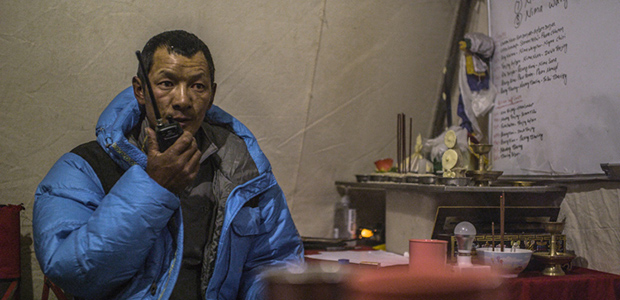
It is purely serendipitous that Jennifer Peedom, the director of the documentary Sherpa, went to the Everest base camp to shoot a film about the famed Nepalese ethnic group renown for their uncanny ability to scale heights, but ended up witnessing and filming the aftermath of the tragic accident in April 2014 that left an unprecedented number of them tragically dead.
Sherpa starts off in a fascinating and visually stunning manner. Focusing on Phurba Tashi, a Sherpa who has scaled the summit a record setting 21 times, it goes behind the scenes to show us the effect of his dangerous vocation on his family and how the people of the area consider Mount Everest (known to them as Chomolungma) a holy and revered spot. The dilemma of earning a living by trampling on blessed ground is in fact a constant concern that reverberates through many of the indigenous people we hear, going as far back as Tenzing Norgay.
In interviews with Tenzing’s children, juxtaposed with the points of view of Western tour operators, we finally get a sense of the chasm between both outlooks. One sees the mountain as a revered place that is to be respected, while the other looks at it as both an economic opportunity as well as something that must be conquered “because it is there.” The film deserves praise for assigning credit to the difficult and often dangerous jobs that the Sherpa do as human mules, from carrying camp setting equipment to traversing through often deadly icefalls numerous times to setup a path as preparation for those who paid a fortune for the privilege to climb.
The stunning cinematography captures the vistas in all their majestic might and the film is a wonderful companion piece to this year’s Everest but despite all of the initial ground that it covers, Sherpa becomes less engrossing when it decides to focus on the long drawn aftermath of the accident and the impasse with the Nepalese government. Instead of the singular point of view of the Sherpa’s we get some tired commentary from the expedition tour operators and their clients along with some forced moments of drama and decision making straight out of lowly reality television shows. This last act U-turn interferes with what is otherwise a fairly competent and objective look at a community of people who are seldom given the credit they deserve.
Rating: 



